Europe has been warned it faces the risk of far greater loss of life in the Mediterranean, after Italy formally ended its year-long mission to rescue stricken migrants and doubts persisted about a new EU force that will replace it.
Italy insisted there would be “no abdication” of search and rescue duties in the waters where its navy has plucked out more than 100,000 shipwrecked refugees since last October. But as it announced the end of its €9m(£7m)-a-month Mare Nostrum mission, refugee groups and experts warned that the deadliest year yet in the Mediterranean could get even worse.
In response to repeated demands from Rome that the European Union step up its presence in waters where more than 3,000 refugees have died this year, the EU border agency Frontex will on Saturday begin coordinating a new operation called Triton. But, rather than replicating the Italian mission, which carried out proactive search and rescue across 27,000 square miles of sea, Triton will focus on border surveillance and operate only within 30 miles of the Italian coast. Its budget, €2.9m, is less than a third that of its predecessor.
Announcing the end of Mare Nostrum in Rome on Friday, defence minister Roberta Pinotti said the Italian navy would maintain a presence – albeit a notably reduced one – in the Mediterranean throughout a two-month transition period.
She and centre-right interior minister Angelino Alfano rejected accusations that the Italian government, in deciding to end the programme, was putting thousands of lives at risk. Alfano said: “What will be done now is what was always done at sea until October last year: obligations stemming from the laws of the sea will be respected. There is no abdication from rescue duties.”
But campaigners and leading NGOs disagreed, pointing out that Triton was never intended to be a substitute for Mare Nostrum and arguing that without the Italian navy’s large-scale mandate there would inevitably be more deaths.
A reminder of the urgency of the situation came on Thursday when yet another boat crammed with refugees leaving from conflict-ridden Libya capsized, leaving at least 20 feared dead.
Tineke Strik, rapporteur for the human rights body the parliamentary assembly of the Council of Europe, said: “We know that [under Triton] there will be gaps and a vacuum in the territorial waters off Libya, for instance, and that is where the main accidents occur.
“Frontex says: ‘Of course, we will also do search and rescue actions,’ but if you don’t have enough capacity will you be there in time? I would expect many more sea deaths the moment that Mare Nostrum is withdrawn.”
Michael Diedring, the secretary-general of the European council for refugees, said the result of Mare Nostrum’s winding-up would be “multiples of the 3,000 that have already perished”.
Begun on 18 October last year, the Italian mission – named after an ancient Roman term for the Mediterranean – was launched in response to two mass drownings off the Italian coast that month. The UN refugee agency puts the total death toll of the two tragedies at more than 600.
With conflict, violence and persecution continuing in countries including Syria, the Palestinian territories and Eritrea, this year has seen a huge increase in the number of people trying to reach Europe by sea. The Italian interior ministry says there have been 153,000 arrivals so far –more than double last year’s figure.
And the flow, while expected to decrease by a certain amount due to the winter weather, is likely to be sustained, at least for now. More than 14,000 migrants arrived in Italy by sea during the course of October, the interior ministry said.
Writing in an ad-style open letter placed in La Repubblica on Friday, the chairmen of Amnesty International Italy and Médecins sans Frontières Italy said they hoped “the absence of an urgent plan to guarantee the continuity of search and rescue activities” was not due to a mistaken belief the inclement weather would stem the tide of refugees.
“It won’t be the arrival of [autumn] that will bring to an end to all-out conflicts in Libya…to the war in Syria and the violence in Iraq,” wrote Amnesty’s Antonio Marchesi and MSF’s Loris de Filippi. “Winter will not lessen the desperate need to flee from war, violence and persecution.” They were “seriously concerned”, they said, about the Italian government’s decision to end Mare Nostrum.
Triton will be coordinated by Frontex, under Italian command, with human and technical assets from 21 EU states, including – but only just – the UK, which is providing one “guest officer” for November.
The British government has refused to give more support, arguing search and rescue missions create “an unintended ‘pull factor’” for migrants. Officials say Triton should be able to assist in rescue missions by coordinating border surveillance operations involving “early detection actions for migrants with aerial surveillance and a certain capacity for naval means”.
But Klaus Rosler, Frontex’s operations director said the first priority would be ensuring effective border control and monitoring of criminal networks in North Africa.
“We expect that Triton will have capacity to tackle migratory flows from Egypt and Libya and it is not limited to the territorial waters of all contiguous zones so it goes on the high seas,” he said.
“Triton is not a replacement for Mare Nostrum,” he stressed. “Frontex is not a coordinating body for search and rescue operations. The responsibility of member states to ensure search and rescue operations and maritime security on this is not substituted for – or suspended by – a border surveillance operation.”
The European commission has also insisted that Triton not be used as an excuse for Italy to evade its international obligations to assist vessels in distress, whoever the passengers may be.
Pinotti said on Friday that over the next two months Italian assets in the Mediterranean would be “notably” diminished and its costs reduced from more than €9m a month to €3.5m. From the “five big ships” of Mare Nostrum, she said, there would be one large vessel stationed at Lampedusa and three smaller patrol boats.
But this did not mean Italy was reneging on search and rescue, she insisted, pointing out that according to maritime rules any vessel requested to intervene in an emergency situation was obliged to do so.
“The fact we are putting into place a transition mission allows us to check how to operate, because we do not think people should die in the sea,” she said. “But be aware: every ship in the sea which is called to respond to a rescue must intervene. So in this aspect the Triton mission is different, but there is no doubt that the moment a rescue is needed ships which are at that point doing something else will have to intervene.”
Alfano said that under the new system more burden would be placed on north African countries such as Egypt and Libya to look after search and rescue operations in their own waters.
Many, however, will be unconvinced by the Italian government’s assurances. “Closing Mare Nostrum now means saying on behalf of Europe that, despite all the conventions we have signed, all the principles out of which Europe was founded and born, we are closing our eyes to what is going on in those countries,” said Bernardino Guardino of the Centro Astalli, a Jesuit service for refugees, in Rome on Friday as a coalition of NGOs including Save the Children Italy urged the government to think again.
Operations compared
· Mare Nostrum
Cost €9m (£7m) a month
Range 70,000km2 of the Mediterranean
Assets Five naval vessels, helicopters, five aircraft, two submarines
Manpower 900 military personnel
Operations 421
Rescues 100,250 people including 14,093 in October
What they say “Mare Nostrum was set up to tackle the increase of migratory flows and consequent tragic ship wreckages off the island of Lampedusa.”
· Triton (an operation led by EU border force Frontex)
Budget €2.9m a month
Range No more than 30 miles from coast
Assets Seven vessels, one helicopter, four fixed-wing aircraft
Manpower 65 officers
What they say “The role of Frontex is key to support member states towards effective border control in the Mediterranean region.”
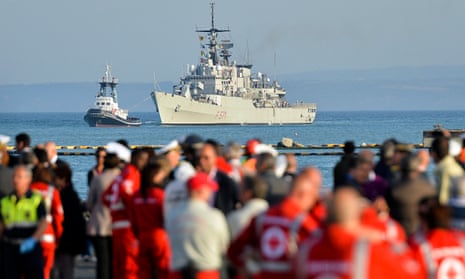
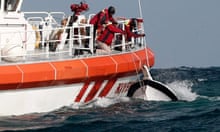
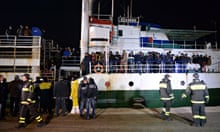
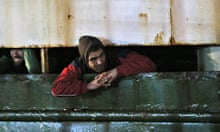
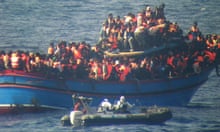



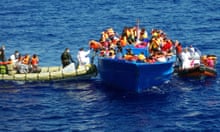
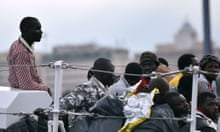

Comments (…)
Sign in or create your Guardian account to join the discussion